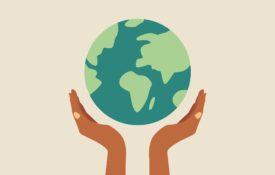-

Video: Observing Earth Day With Psychological Science
In recognition of Earth Day 2022, we have collected and summarized flash talks that discuss the effects of nature-assisted rehabilitation on mental health, the risks of air pollution exposure during childhood, the motivations behind climate-related discussions, and more.
-
Algorithms, Lies, and Social Media
There was a time when the internet was seen as an unequivocal force for social good. It propelled progressive social movements from Black Lives Matter to the Arab Spring; it set information free and flew the flag of democracy worldwide. But today, democracy is in retreat and the internet’s role as driver is palpably clear. From fake news bots to misinformation to conspiracy theories, social media has commandeered mindsets, evoking the sense of a dark force that must be countered by authoritarian, top-down controls. This paradox — that the internet is both savior and executioner of democracy — can be understood through the lenses of classical economics and cognitive science.
-
Mental Health Problems Come With ‘Cost’ of Poorer Cognitive Function
All types of mental disorders come with a hidden cost in the form of cognitive dysfunction, including deficits in memory, attention, executive functions and processing speed, according to a comprehensive study that my colleagues and I published in June in the journal Clinical Psychology Review. We found that both diagnosable mental disorders, as well as some common symptoms such as anxiety and worry, carry a “cognitive price.” We termed this phenomenon “The C Factor” — short for cognitive dysfunction. This can be defined either as lower performance on cognitive tests or reduction in cognitive abilities, such as attention and memory.
-
What Does It Take To Be an Effective Mental Health App?
Accessing mental health care has long been difficult, and the pandemic has further increased the strain. And there are thousands of mental health apps — about 20,000 and counting — designed to tackle the problem. They range from mood trackers, guided mindfulness exercises and apps with chatbots that teach coping skills. Spending on them has grown quickly since 2019 and is predicted to reach about $500 million this year, according to a report from Deloitte. But not all these apps are backed by science.
-
M.R.I.s Are Finding Connections Between Our Brain Activity and Psychology
In March, neuroscientists and psychiatrists from the School of Medicine at Washington University, St. Louis, along with colleagues elsewhere, published a study in the journal Nature that sparked widespread discussion in their fields. Researchers, the study noted, are increasingly using magnetic resonance imaging — which can reveal the brain’s structure and activity — to try to find links between what is seen on an M.R.I., like cortical thickness or patterns of connection, and complicated psychological traits, like cognitive ability or mental-health conditions. In theory, such so-called brain-wide association studies could yield incredibly valuable insights.
-

New Research in Psychological Science
A sample of research on beliefs and information search, power holders and bribes, attitudes, children and choice, food judgments, gratitude, attitudes toward sexual assault, metacognition, and masculinity-contest cultures in organizations.

